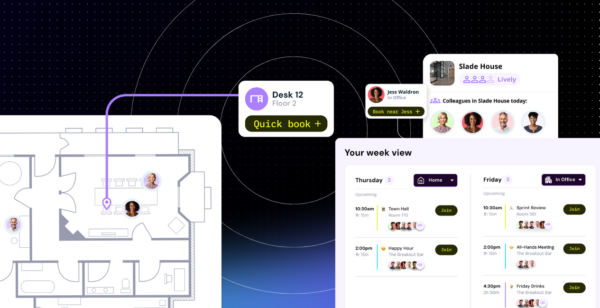5 Critical Hybrid Working Challenges Facing NHS Trusts in 2025

Hybrid work – it began as an emergency response to the pandemic, but it’s now a strategic imperative. Hybrid working isn’t just about flexibility anymore, but unlocking new potential while navigating unprecedented cost pressures and sustainability goals.
NHS Property and Estates leaders across the UK are grappling with a complex equation: how do you reduce estate costs while maintaining operational excellence and supporting frontline healthcare delivery?
In this post, we’ll cover five critical hybrid working challenges. Overcoming them is what will separate successful NHS Trusts from those struggling to adapt.
Virtual Roundtable: Unlocking the NHS Workplace
Check out this virtual round table with senior leaders from NHS property and estates departments for a deep dive into how hybrid work is reshaping the NHS' workplace, sustainability, and savings approaches.

Challenge 1: Skyrocketing real estate costs
NHS estate costs represent billions in annual expenditure, making efficient space usage a critical priority for every Trust. The pressure to demonstrate ROI from property investments has never been more intense, but traditional approaches to space planning are failing in the hybrid era.
The challenge isn’t simply about cutting space, but about optimizing space usage to deliver maximum value. Some NHS Trusts have achieved 30-40% reductions in administrative office footprint while actually improving operational efficiency. Others have made space cuts that undermined productivity and staff satisfaction, ultimately costing more than they saved.
Challenge 2: Inefficient, inflexible workplace planning
The old model of fixed desk allocations and predictable space requirements has given way to dynamic, flexible environments that must adapt to changing needs in real-time.
This transformation requires new approaches to:
- Space allocation that responds to actual usage patterns rather than historical assumptions
- Technology integration that supports flexible working across clinical and administrative functions
- Policy development that balances operational needs with employee flexibility
- Resource management that optimizes everything from desk availability to meeting room utilization
NHS organizations face unique planning challenges that private sector companies don’t encounter. Clinical services require physical presence and specialized spaces, while administrative functions can operate more flexibly. Coordinating these different needs while maintaining organizational coherence requires sophisticated planning approaches.
Challenge 3: Advancing NHS Net-Zero and sustainability goals
The NHS commitment to net-zero emissions by 2040 makes workplace sustainability a critical priority. Hybrid working offers significant opportunities to reduce carbon footprint through optimized space utilization, reduced commuting, and more efficient building operations.
However, achieving these benefits is impossible without strategic implementation. Poorly planned hybrid policies can actually increase energy consumption per person if buildings remain fully operational for reduced occupancy.
Leading NHS Trusts are discovering that effective sustainability requires comprehensive measurement of:
- Energy consumption per occupied space rather than total building consumption
- Carbon emissions from commuting patterns and how hybrid policies affect them
- Space efficiency metrics that demonstrate environmental ROI from estate optimization
- Waste reduction from more efficient space and resource utilization
Challenge 4: Finding and implementing the right hybrid workplace solutions
Most NHS Trusts began their hybrid journey with simple booking systems or basic remote work policies. But as hybrid working matured, the limitations became clear: no integration with existing NHS systems, no occupancy insights, no employee experience optimization, and no data to drive strategic decisions.
Effective hybrid workplace solutions for the NHS must address:
- Complex IT environments with legacy systems and strict security requirements
- Integration challenges with existing Microsoft and clinical systems
- User adoption across diverse staff groups with varying technical comfort levels
- Compliance requirements specific to healthcare environments
- ROI demonstration with measurable benefits for estates and operations teams
NHS IT environments present unique challenges that many workplace technology solutions can’t handle. Systems that work brilliantly in other sectors often fail when they can’t integrate with NHS infrastructure or meet healthcare-specific compliance requirements.
Challenge 5: Learning from real-world NHS experiences
NHS Trusts implementing hybrid workplace solutions don’t need to repeat the mistakes others have made. The most common pitfalls include:
- Technology-first approaches without understanding user needs or organizational requirements
- Insufficient change management for the cultural shift required in healthcare environments
- Inadequate integration planning with existing NHS systems and processes
- Unrealistic timeline expectations for complex healthcare organizations
- Limited stakeholder engagement across clinical, estates, and IT teams
The NHS leaders speaking at our seminar have navigated these challenges successfully and will share practical insights about:
- What they wish they’d known before starting their hybrid workplace journey
- Specific strategies that delivered measurable results in NHS environments
- Change management approaches tailored for healthcare organizations
- Technology decisions that proved most effective for NHS requirements
- ROI measurement and demonstrating value to NHS leadership
Check out this virtual round table with senior leaders from NHS property and estates departments for a deep dive into how hybrid work is reshaping the NHS' workplace, sustainability, and savings approaches.
Watch this virtual round table with senior leaders from NHS property and estates departments for a deep dive into how hybrid work is reshaping the NHS' workplace, sustainability, and savings approaches.

Share this post






















